

Custom Search
Are we Living in the Last Days...End Times? See Breaking News |
 |
| __________________________ |
 |
________________________ |
| ________________________ |
As You Study the Biblical Last Days in the News... Discover the Bible As Well |
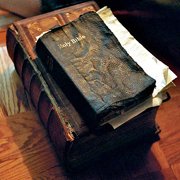 |
| ________________________ |
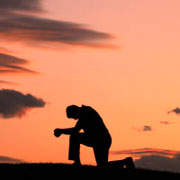 |
| ________________________ |
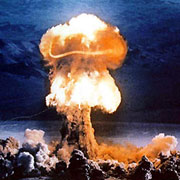 |
| ________________________ |
To Know God's Word Read Scripture |
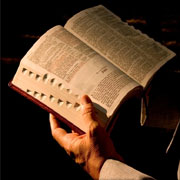 |
_______________________ |
To Read God's Word Your Reading Schedule |
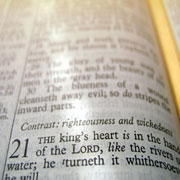 |
_______________________ |
 |
| _________________________ |
Thought Provoking Articles for Your Meditation |
 |
_______________________ |
|
|
|
|---|---|
A. Sacrifice as a Basis of Acceptable Worship |
|
Leviticus 1-7 the Offerings
|
|
Leviticus 1:1-2 Introduction. God calls to Moses from the tent of meeting and reveals his will. Moses is to pass this information on to the community. |
|
Leviticus 1:3-17 The Burnt Offering. Purpose is not explained, but effects are. To be done on daily basis, describes which animals to use, and how to use them. |
|
Leviticus 2 The Grain Offering (Less expensive form of burnt offering). Can be used by itself to express joy and thanksgiving. More often used in connection with larger ritual process. |
|
Leviticus 3 Offering of Well-Being (Peace offering). Differs from the burnt offering in that only the fat is burned. The worshipers, essentially making it a fellowship meal with God and the worshipers as participants, eat the rest of the animal. Its celebration marks various points in Israelite history. These are voluntary sacrifices, done in gratitude to God. |
|
Leviticus 4-5 Sin Offerings…or Better Known as Purification Offerings. |
|
Used primarily to restore the sanctity of the temple or surrounding areas. This is when someone does something wrong inadvertently. This is not intended to be in disobedience to God, but covers those situations that are unintentional. Such sins are taken seriously out of concern that God may abandon His people if the temple is defiled. Purification deals both with the offender and the surrounding area. It matters who the sinner was…different sinners require different sacrifices. The sin of an anointed priest defiles the community more than an ordinary person and a more thorough purification process is needed. Guilt is essential, even though the act was unintentional. |
|
Leviticus 4:3-12 Discusses sins of priests. |
|
Leviticus 4:13-21 Sins of the community as a whole. |
|
Leviticus 4:22-26 Sins of a ruler or an ordinary person. |
|
Leviticus 4:27-35 Some purification of sin requires goats, others sheep. |
|
Leviticus 5:14-6:7 Guilt Offerings or sometimes thought to be Reparation Offerings. Deals with things that ought not to be done (on purpose). |
|
Leviticus 5:14-19 First example involves sins against God. Violates the boundaries relating to holy things; trespasses against holy property. If a person uses an item inappropriately that had been dedicated to God. Reparation requires ritual enactment. |
|
Leviticus 6:1-7 Second example involves sins against others. Cases are described involving the use of God's name in vain in uttering false oaths in court. These actions make God a partner to malicious dishonesty. Confession of the sin is required in addition to ritual enactment. Effects of the rituals include: expiation of sin, forgiveness, and new life. |
|
Leviticus 6:8-7 Burnt Offerings. "How To" instructions are given. Addressed to the priests, including the sacrifices previously mentioned. Specifies how to clean the ashes from the altar while maintaining the fire. Ashes are holy and cannot remain in the camp, but cannot be placed in unclean place either. Each type of sacrifice is treated separately, telling the priests how to handle the blood, who can eat which parts, and how. If these are not followed to the letter, the whole sacrifice can be invalidated. |
|
Leviticus 8-10 Innauguration of the Priesthood |
|
The first seven chapters focused on sacrifices. Now the story picks up where it ended in Exodus. Moses has built the tabernacle and now inaugurates Aaron and his sons as priests. |
|
Leviticus 8 The Ordination of the Priests. |
|
Leviticus 8:1-5 The whole congregation is assembled and called to witness the ordination. |
|
Leviticus 8:6-9 The uniform. Much attention is given to the clothes of high priest, draws attention to the office rather than the individual. |
|
Levititcus 8:10-13 The actual anointing…both of Aaron and of the tabernacle. |
|
Leviticus 8:14-17 Purification Offering…cleansing of area, making it holy. |
|
Leviticus 8:18-21 The Burnt Offering…offering a ram for expiation of their sins. |
|
Leviticus 8:22-30 The Peace Offering…oil and blood meant to sanctify Aaron and his son. Blood smeared on tips of ear, thumb, big toe…the parts stand for the whole. |
|
Leviticus 8:31-36 Final instructions to Aaron…told how to eat the sacrifice. A description is given on the need to sacrifice daily for seven days…long process. |
|
Leviticus 9 Aaron's First Sacrifices |
|
After a week of preparations, Aaron is ready. So on the eighth day, he takes over the duties of high priest, essentially running through the gambit of all the various sacrifices. With the people in attendance, Aaron faithfully executes every detail. Then the "glory of the Lord" appears to the people and fire comes from the Lord and consumes the offerings upon the altar. This is seen as a sign of God's approval. Aaron passes all the tests. He's in place where he should be. |
|
Leviticus 10 The Death of Aaron's Two Sons |
|
Just when everything should be going well, disobedience sets in. |
|
Leviticus 10:1-3 Two of Aaron's sons make a "strange" (unholy) offering. They are immediately consumed by fire. |
|
Leviticus 10:4-7 Moses commands two other sons to care for the bodies, forbids mourning. Sins of brothers could not be condoned, hence no time for grieving was allowed. Unlike first two sons, all commands are followed to the letter. |
|
Leviticus 10:8-11 God speaks to Aaron directly. Regardless of his son's actions, Aaron is still high priest. |
|
Leviticus 10:12-18 More sacrifices are offered; two of Aaron's sons didn't eat when they should have. |
|
Leviticus 10:19-20 Aaron tries to intervene on their behalf. Shows God's graciousness to those who make mistakes compared to those who blatantly and carelessly enter his presence. |
|
Leviticus 11-16 The People-Instructions on Purity |
|
If the first seven chapters were a virtual "how-to" book regarding sacrifices, then these chapters are a handbook for the priests in terms of purity matters. At issue is how to keep the sacred space pure, and how to restore purity when it has been violated. The answer to the second part is through animal sacrifice. The answer to the first part is knowing what to avoid and what is acceptable. |
|
Leviticus 11:1 The Lord "said to Moses" |
|
Leviticus 11:2-23 Edible and non-edible animals. Animals mainly fall into three groups: air, land, and sea. Clean animals are those, which follow the standard types. Unclean animals are those, which transgress the expected…such as fish without fins; insects that fly but also have legs; pigs that have cloven feet but don't chew their cud. Ancient Israel saw themselves as people of God and different from the outside world; in like manner the same standard was applied to the animals. Every time the Israelites ate meat or sacrificed, they were reminded of their special and holy status before God, by limiting their consumption to animals that were as "pure" as they were. |
|
Leviticus 11:24-40 Carcasses: Regardless whether it's a clean or unclean animal, all carcasses transmit uncleanness when touched. |
|
Leviticus 11:41-43 Anything that swarms are unclean. |
|
Leviticus 11:44-47 Rules are repeated; rationale is given. Israel maintains its holiness before God by avoiding eating or contact with animals that are not holy. |
|
Leviticus 12:1-8 Uncleanness of childbirth. It is not the mother that is unclean, nor the infant. It is simply the discharge that accompanies childbirth. The mother brings forth life but in the process loses some of her own life through the loss of blood. |
|
Leviticus 13:1-44 Problems with skin diseases and growths. Skin eruptions were oftentimes seen as God's punishment for some wrong doing, hence, this was mainly a religious issue. Priest's job was to declare the uncleanness, decide what actions should be taken, and after healing had occurred, perform the ritual purification that was required. |
|
Leviticus 14:1-57 Purification Rituals…post disease. Rituals had nothing to do with healing or curative efforts. Only concern is to purify what had been unclean. |
|
Leviticus 14:1-32 How to restore the person who was unclean; move him/her from outside to back inside the camp (society). |
|
Leviticus 14:33-57 How to restore a "sick" house. All household items were lost; house had to be repaired. Then ritually made pure. If it happened a second time, house was destroyed. Impurities might be like fungus, or mold on walls. |
|
Leviticus 15:1-33 Bodily discharges. Males and females with bodily discharges were unclean. Even normal intercourse and menstruation had its purification requirements. Abnormal discharges required a special and lengthier process. Any bedding, chairs, saddles, or dishes touched by an unclean person became unclean. Anyone touching those items, or the person, immediately became unclean as well, and was required to go through the purification process. The idea was to protect the integrity of the body. Reproduction issues are important because they involve life and death, beliefs about divine blessings, and affect the whole society. |
|
Leviticus 16:1-34 The Day of Atonement (Yom Kippur): Once a year, the camp needed to be purified, and the sins of the people were to be forgiven. This was the time when the high priest entered the Holy of Holies. Obviously a sinful man cannot stand in the presence of God, so he had to be made pure first. Then the whole community was cleansed and integrity was restored. |
|
Leviticus 16:20-22 The Scapegoat. As part of the ritual, a goat was sent out of the camp into the wilderness, a visual reminder of the reality of sin and the need to send it out of the camp. |
|
Leviticus 17 The Altar The Holiness Code: |
|
Has to do more with social interaction than formal worship. |
|
Leviticus 17:1-16 Rules about sacrifice and blood. No domesticated animals were to be killed outside the tabernacle; all blood needed to be drained before any meat could be eaten. The idea was that the life of the animal was given by God and could only be taken in sacrifice to God. If an animal was killed in the wild, its blood had to be poured out in respect for God. |
|
Leviticus 18-20 Regulations for the People |
|
Leviticus 18 Rules governing sexual behavior. Begins with a basic plea to avoid acting like the heathen. It includes a list of both prohibited and permitted sexual partners. The instructions indicate a very close connection between rituals and ethical/moral issues. Whole idea was to protect the integrity of the family. |
|
Leviticus 19 How to live a holy life. This chapter covers a whole series of laws leading to practical holiness. Parents are to care for their children; children are to honor their parents. Israelites are commanded to love their neighbors as well as the resident stranger. It indicates that every aspect of life is under God's domain. There are echoes of the Ten Commandments throughout. |
|
Leviticus 20 A list is given of penalties for those times when people transgress the rules. This is what was supposed to happen to the person who broke the rules. The idea was always to protect the society, to keep the camp pure and holy before God. It demands that the community be responsible for itself and its members. Sometimes punishment from God is expected, but primarily this is a community issue. Usually the offenders were "cut off" from the community; sometimes they were stoned to death. |
|
Leviticus 21-22 Regulations for the Priests |
|
Leviticus 21 How to maintain the holiness of the priests. Basically a how-to list of what priests could or could not do (couldn't touch dead bodies). There were restrictions on whom they could marry (must be a virgin); what happened if a family member misbehaved, or they got sick. They were held to a higher standard than ordinary members of the community, primarily because of their functions within that community. |
|
Leviticus 22 A reminder to the priests to respect their offerings and their position. Reminds them never to take their position for granted. `They must remain worthy of their charge to be God's intermediaries for the people, in every aspect of their lives…including what they ate, and how they ate it. Getting enough food was considered part of their "salary." Animals were also to be without blemish. |
|
Leviticus 23-24 Regulations for the Nation |
|
Leviticus 23 The Sacred calendar. Explanation is given to when all the special feasts are to occur… seven in all, corresponding to previous lists. The feasts are: Passover, Unleavened Bread, First Fruits, Pentecost, Trumpets, The Day of Atonement and Tabernacles. In addition there are instructions given with respect to the Sabbath and Passover. |
|
Leviticus 24 Regulations |
|
Leviticus 24:2-9 How to care for the lamp in the tabernacle. |
|
Leviticus 24:10-23 How to handle a case of blasphemy. |
|
Leviticus 25-27 Regulations for the Land |
|
Leviticus 25 Sabbatical and Jubilee years. The Sabbatical year occurs every seventh year, meaning that the land is to "rest". God will provide a bumper crop in the sixth year so all will have enough. Additionally, every 50 years will be a time of release for slaves, debts, and land. This Jubilee year reminds the Israelites that the land belongs to God and they are merely stewards for him. Hence, if land has been leased or rented (perhaps to pay a debt), it returns to its initial owner. |
|
Leviticus 26 Blessings and Curses. |
|
Leviticus 26:1-39 Describes rather definitively that obedience leads to blessings; disobedience leads to curses. Blessings will include fertility, abundance of crops, success against enemies, and the presence of God. Curses include the opposite of these, ending with the loss of the land and exile. |
|
Leviticus 26:40-46 Hope, for when all hope is gone. Israel has merely to repent and make amends; then all will be restored. Exile will not be the final answer. The nation will never be totally destroyed, but the people are to be held accountable for their actions. |
|
Leviticus 27 Concluding remarks on vows and tithes. If a vow is made involving a person or animal, how much will it cost to satisfy the vow? Chapter 27 is all about economics. Vows can be redeemed. Land has a value. But some things belong only to God (the firstborn) and cannot be bought or sold. |
|
|
|
|
© Copyright Nugget Net Review 2013. All rights reserved